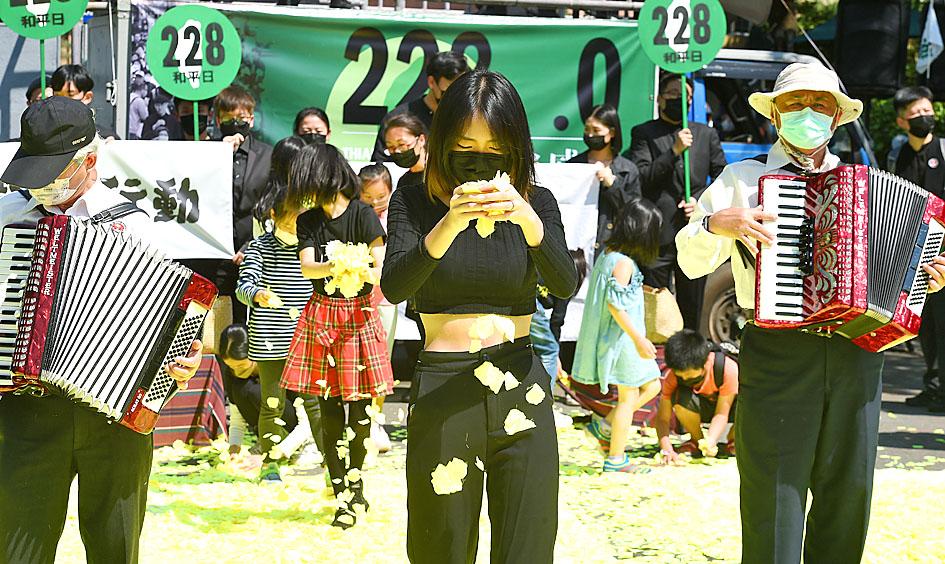Civic groups and hundreds of participants marched through the streets of Taipei to commemorate the 75th anniversary of the 228 Incident, with music and street performances occurring at the Executive Yuan building, ending with a scattering of flower petals to symbolize hope for a brighter future for younger generations.
The day’s main organizers were the Nylon Cheng Liberty Foundation along with more than 50 civil society organizations.
The events began at the Tianma Tea House (天馬茶房) in Taipei’s Datong District (大同), the site of conflict that sparked the Incident in February 1947.

Photo: Liao Chen-huei, Taipei Times
Organizers in a statement made three requests of the government: to complete the transitional justice process, to remove all symbols of authoritarianism, and to build a new Taiwanese nation as it fights Chinese imperialism.
People marched through the streets and drove vehicles adorned with the names of people who were killed in the Incident, with the procession terminating in front of the Executive Yuan. Members of the Seek Truth and Justice for Victims of 228 Incident advocacy group addressed the crowd, followed by dancers and musicians performing street theater choreographed by the Tsai Jui-yueh Dance Research Institute.
Three white banners were laid on the ground, with performers expressing words and feelings in sign language, as people scattered woven colored cloth emulating periwinkle flower petals.
The banners represented the Taiwan homeland and its fertile land, and the petal imagery coming from the works of Taiwanese writers who have referred to the periwinkle flower’s year-round bloom, said Koeh Jun-teng (郭潤庭) of the advocacy group From Ethnos To Nation.
“The performance represented the fear and despair as people were silenced after the 228 events and throughout the White Terror era, but they passed stories of what they witnessed in private,” Koeh said.
“The scattering of periwinkle petals represented the blooming that Taiwanese people hope for as they aspire to overcome fear,” she added.
Solemn music was played by accordion among the cloth petals in remembrance of the thousands of people who were killed by the Chinese Nationalist Party (KMT) authoritarian regime.
Lawyer Lee Sheng-shung (李勝雄) and Chen Yung-hsing (陳永興), led the march. They along with Deng Nan-jung (鄭南榕) cofounded the 228 Peace Day Association. Democracy advocates followed behind the duo.
The first marches to commemorate the Incident were held in Taipei, Taichung, Kaohsiung and Changhua in 1987, despite bans against such demonstrations at the end of Taiwan’s martial law era.
Lee said that the KMT government at the time tried to stop the marches by deploying hundreds of riot police and plainclothes agents who put up barriers.
Conflict broke out, with the largest clash occurring in Changhua, as police used truncheons to beat participants.
Lee said that he sustained injuries and bled profusely after being hit several times on the head.
In his address to the crowd, Lee said that Taiwanese are still waiting for truth and justice 75 years after the 228 Incident.
“We demand that all statues of [former president] Chiang Kai-shek (蔣介石) be removed, and to dismantle his memorial hall in Taipei. It is time to stop worshiping a dictator who was responsible for killings of Taiwanese people during the 228 Incident,” Lee said.

An essay competition jointly organized by a local writing society and a publisher affiliated with the Chinese Communist Party (CCP) might have contravened the Act Governing Relations Between the People of the Taiwan Area and the Mainland Area (臺灣地區與大陸地區人民關係條例), the Mainland Affairs Council (MAC) said on Thursday. “In this case, the partner organization is clearly an agency under the CCP’s Fujian Provincial Committee,” MAC Deputy Minister and spokesperson Liang Wen-chieh (梁文傑) said at a news briefing in Taipei. “It also involves bringing Taiwanese students to China with all-expenses-paid arrangements to attend award ceremonies and camps,” Liang said. Those two “characteristics” are typically sufficient

A magnitude 5.9 earthquake that struck about 33km off the coast of Hualien City was the "main shock" in a series of quakes in the area, with aftershocks expected over the next three days, the Central Weather Administration (CWA) said yesterday. Prior to the magnitude 5.9 quake shaking most of Taiwan at 6:53pm yesterday, six other earthquakes stronger than a magnitude of 4, starting with a magnitude 5.5 quake at 6:09pm, occurred in the area. CWA Seismological Center Director Wu Chien-fu (吳健富) confirmed that the quakes were all part of the same series and that the magnitude 5.5 temblor was

The brilliant blue waters, thick foliage and bucolic atmosphere on this seemingly idyllic archipelago deep in the Pacific Ocean belie the key role it now plays in a titanic geopolitical struggle. Palau is again on the front line as China, and the US and its allies prepare their forces in an intensifying contest for control over the Asia-Pacific region. The democratic nation of just 17,000 people hosts US-controlled airstrips and soon-to-be-completed radar installations that the US military describes as “critical” to monitoring vast swathes of water and airspace. It is also a key piece of the second island chain, a string of

The Central Weather Administration has issued a heat alert for southeastern Taiwan, warning of temperatures as high as 36°C today, while alerting some coastal areas of strong winds later in the day. Kaohsiung’s Neimen District (內門) and Pingtung County’s Neipu Township (內埔) are under an orange heat alert, which warns of temperatures as high as 36°C for three consecutive days, the CWA said, citing southwest winds. The heat would also extend to Tainan’s Nansi (楠西) and Yujing (玉井) districts, as well as Pingtung’s Gaoshu (高樹), Yanpu (鹽埔) and Majia (瑪家) townships, it said, forecasting highs of up to 36°C in those areas